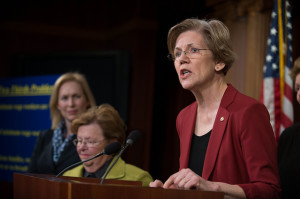
CRomnibus opponent Sen. Elizabeth Warren
Conservatives and Liberals finally agree on one thing: they hate the $1.1 trillion continuing resolution of the omnibus federal spending bill (nicknamed “CRomnibus”) designed to fund the U.S. federal government through September 2015. However, conservatives and liberals oppose the bill for different reasons. Strolling through the Twitter hashtag #CRominbus, as well as reading and hearing statements from various quarters, is quite revealing.
The CRomnibus bill opened up rifts in the Democratic and Republican parties. President Obama lobbied Democrats to pass the bill, but some Democrats, such as House Minority Leader Nancy Pelosi and Senator Elizabeth Warren, harshly criticized the bill. Liberals such as Pelosi and Warren don’t like a bunch of the CRomnibus provisions, such as:
- Deregulating the 2010 Dodd-Frank protections on risky trading of derivatives, which is blamed at least in part for the 2008 financial crash that plunged the U.S. into the Bush Great Recession, and putting U.S. taxpayers back on the hook to bail out the banks if they make these bad decisions again;
- Increasing the limit on individual campaign contributions to political parties (so-called “soft money”) by tenfold, up to $ 300,000;
- Increasing the Pentagon budget to $ 554 billion, including hundreds of millions of dollars for military aircraft that the Pentagon didn’t even request;
- Cutting up to 50 percent from multiemployer pension plans which cover hard-working truck drivers, construction workers and others;
- Nullifying voter-approved marijuana legalization in the District of Columbia, which was in part an effort to reduce the racist effects of marijuana possession arrests;
- A $93 million cut to the Special Supplemental Nutrition Program for Women, Infants and Children (“WIC”); and
- Cuts to the Environmental Protection Agency (“EPA”) budget.
On the Republican side, House Speaker John Boehner led the effort to pass the bill in the House (with the aforementioned Democratic votes) and send it to the Senate, but a number of conservatives in Congress, including Senators Rafael “Ted” Cruz and Mike Lee, as well as many conservative voters, are very upset with Boehner and Republican Senate Minority Leader Mitch McConnell. Conservatives say that Republicans who pushed for the CRomnibus sold out conservative principles because the bill:
- Fully funds (i.e., does not strip funding from) the Affordable Care Act;
- Fully funds (again, meaning does not de-fund) President Obama’s executive action on immigration (which Republicans call “amnesty”);
- Runs over 1,600 pages in length and contains lots of spending, making it the very essence of Big Government that conservatives say they oppose.
The sentiment of some conservatives was voiced by Twitter user @GOPNoWhiteGuilt, who wrote:
Shame on #BOEHNER for passing CRomnibus. #Dreamers are NOT welcomed in GOP!
This person wrote in another tweet:
Proud 2 be the TOP #Racist!
A third tweet by GOP No White Guilt reads:
We will NEVER Welcome Horrible #Hispanics into the #GOP.
Ultimately, however, the CRomnibus passed both Houses of Congress. 57 Democrats joined 162 Republicans to pass the bill in the House with 219 votes, just one more than the minimum 218 that was needed. One analysis revealed that House Democrats who voted for the bill had received twice as much money from the financial industry as House Democrats who voted against the bill. In the Senate, both parties experienced a roughly equal split. Democrats divided 31 to 24 in favor of the bill, and Republicans voted 21 to 18 in favor. The two Independents, both of whom caucus with the Democrats, also split their votes.
So we have an unusual situation. For once, conservatives and liberals agree on something, but for completely different reasons. Many people across the political spectrum feel that their interests were not represented in this legislative process. For example, on Friday, James McDonald a/k/a @TURNEDTOS1 tweeted:
#CRomnibus deregulates WallStreet and funds#immigrationaction‘s cheap#illegal labor. A double win for the 1%.
This suggests that, if one or more political candidates emerge with a populist message that appeals to the remaining 99 percent of voters on both sides, they could be enormously successful.
Photo by Senate Democrats, used under Creative Commons license. http://is.gd/u2cYkE



[…] By Messaging Matters […]